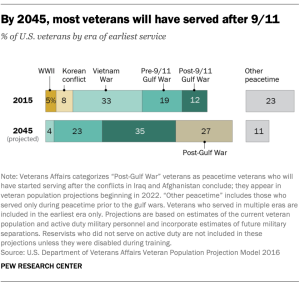

Three decades after the fall of the Berlin Wall, people in former West and East Germany overwhelmingly say the unification of their country was a positive development, according to a new Pew Research Center survey. Large majorities in both areas say the changes that have unfolded in Germany since 1989 have had a good influence on living standards, health care and national pride, and most also see improvements in areas including family values, spiritual values and law and order.
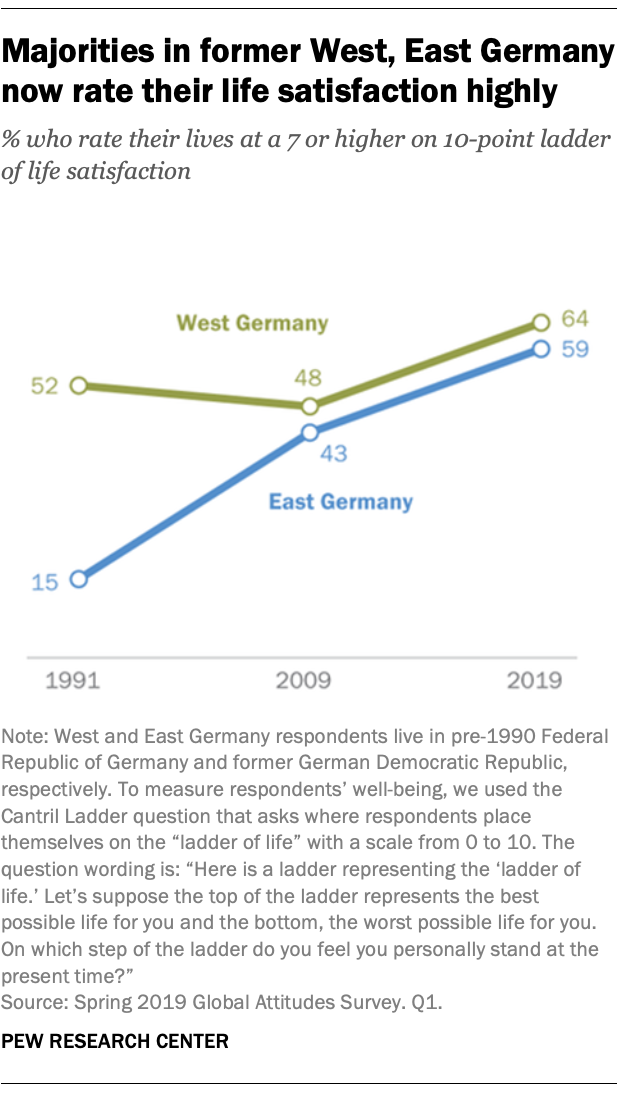
On a personal level, too, Germans are happier with their lives, according to the survey, which was conducted in spring 2019 among representative samples of adults in the pre-1990 Federal Republic of Germany (West Germany) and former German Democratic Republic (East Germany). Majorities in both areas now place themselves at 7 or higher on a 10-point “ladder” of life satisfaction, where 10 represents the best possible life. When Pew Research Center asked the life satisfaction question in 1991 and 2009, no more than roughly half in either area placed themselves in this top tier. The increase has been especially dramatic in the former East, where the share who rate their lives at 7 or higher has almost quadrupled from just 15% in 1991 to 59% this year.
Despite widespread positive sentiments among Germans about the changes of the past 30 years, the perspectives of those in the former West and East still differ in some notable ways. Here is a look at some of the areas where these differences are most pronounced.
People in the former West are more satisfied than those in the former East with the way things are going in their country today, including the performance of Germany’s democracy. Around six-in-ten adults in former West Germany (61%) are satisfied with the way things are going in Germany, compared with 37% who are dissatisfied. Opinion is more evenly divided in former East Germany, where 50% are satisfied and 47% are not.
When it comes to the way Germany’s democracy is working, around two-thirds of those in the former West (66%) are satisfied, compared with a narrower 55% majority among those in the former East.
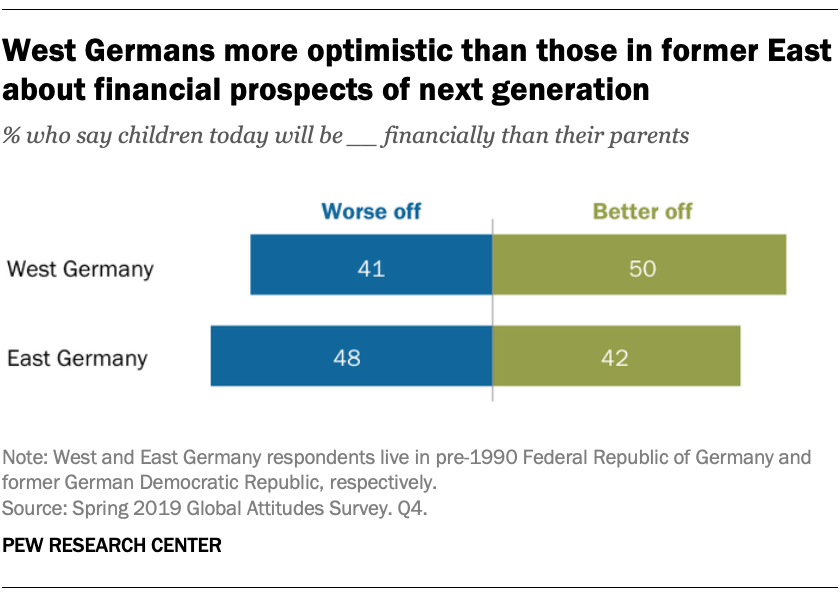
On a variety of measures, those in the former West are more optimistic about the future than their counterparts in the former East. More in the former West say they are optimistic than pessimistic when it comes to the education system (57% optimistic vs. 41% pessimistic) and how the nation’s political system works (53% vs. 45%). In the former East, people tend to be more pessimistic than optimistic in both of these areas.
People in the former West are also more likely than those in the former East (50% vs. 42%) to say children today will be better off financially than their parents when they grow up.
Attitudes toward the EU are more positive in the former West than in the former East. Germans are generally pro-European Union, but the share of adults who have a favorable view of the EU is higher in the former West than in the former East (72% vs. 59%). Similarly, three-quarters of those in the former West say Germany’s membership in the EU is a good thing, compared with 62% of those in the former East.
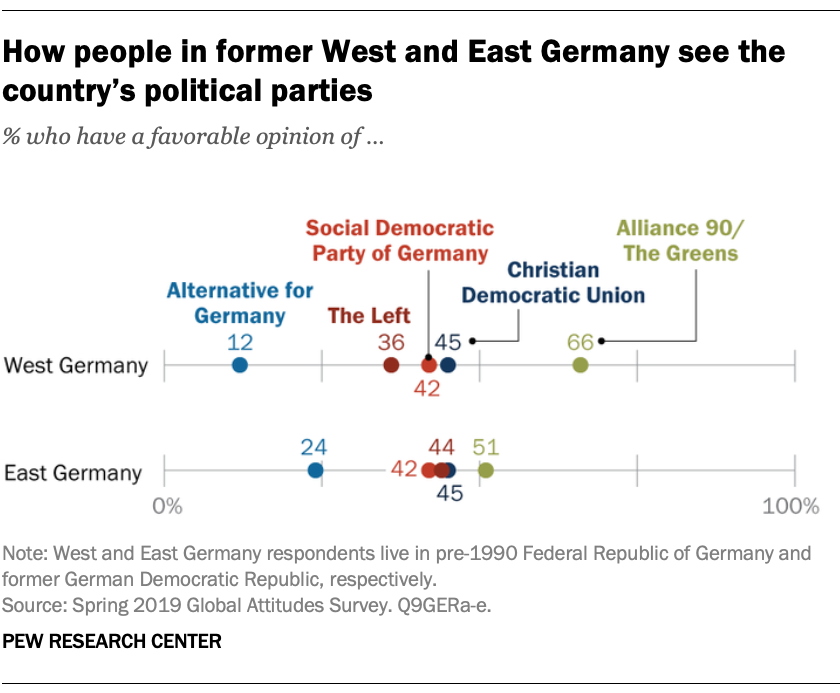
People living in the former East are twice as likely as those in the former West to have a favorable opinion of the country’s right-wing populist party, Alternative for Germany (AfD). While its nationwide favorability remains relatively low, AfD has made electoral gains recently, particularly in the former East. In Pew Research Center’s new survey, 24% of adults in the East express a favorable view of AfD, compared with 12% of those in the former West.
Views of two main centrist parties in Germany, the Christian Democratic Union (CDU) and the Social Democratic Party (SPD), are roughly the same in the former West and East Germany. Among adults in both the former West and East, 45% have a favorable view of the CDU, while 42% have a favorable opinion of the SPD.
Around two-thirds of adults in former West Germany (66%) have a favorable opinion of Alliance 90/The Greens, compared with 51% of those in the former East. Meanwhile, those in the former East are more likely than those in the former West (44% vs. 36%) to have a favorable view of The Left party, a successor to the Communist Party in the former German Democratic Republic. People in former West Germany are more likely than those in the former East not to offer an opinion on The Left.
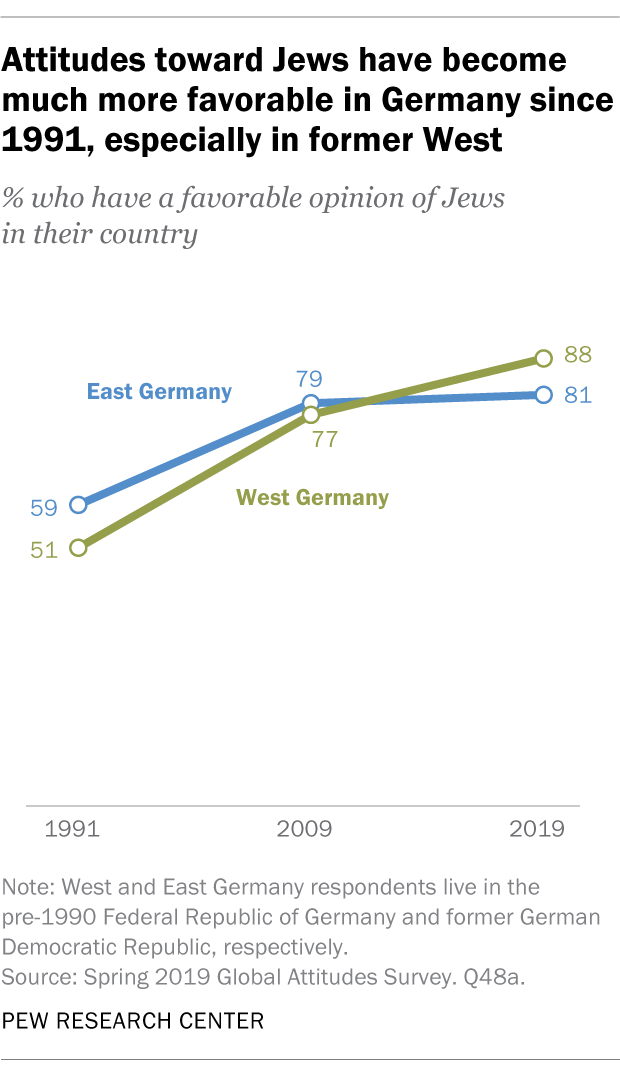
Those in former East Germany hold more negative views toward certain minority groups than people in the former West. Majorities in both areas see Muslims and Jews favorably, but those living in the former East are 14 percentage points more likely than their Western counterparts to have an unfavorable view of Muslims (36% vs. 22%) and about twice as likely to have an unfavorable view of Jews (12% vs. 5%).
Views of another minority group – Roma – are decidedly more negative in both areas, but people in the former East are again more likely than those in the former West to express an unfavorable opinion (48% vs. 35%).
Over the long term, there have been some notable changes in views toward minority groups in both areas. In 1991, for example, around a quarter of those living in former West Germany (27%) expressed an unfavorable view toward Jews – about twice the share expressing that view in the former East (12%). Since then, views toward Jews have become much more favorable in both areas – especially in former West Germany, where around nine-in-ten (88%) now hold a favorable opinion, up from around half (51%) in 1991.
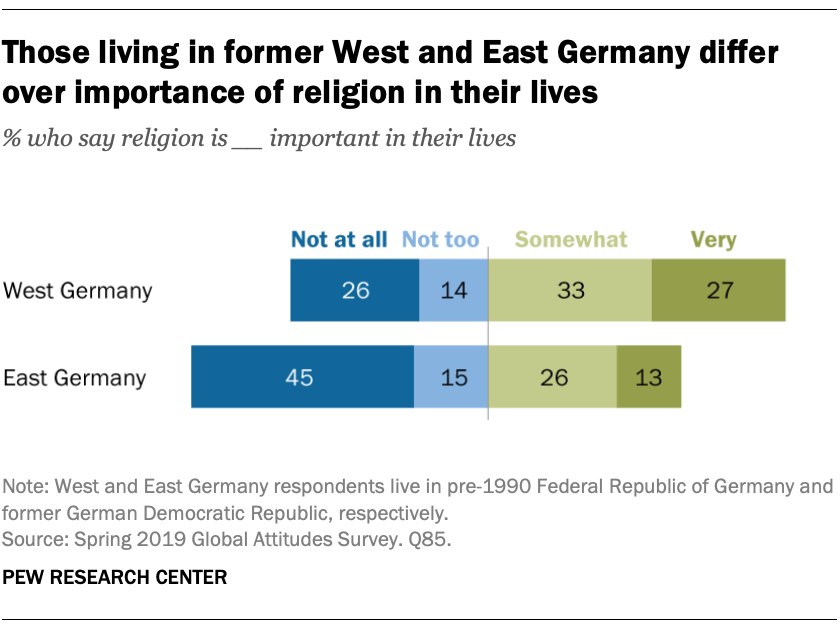
Religion is more important to people in the former West than those in the former East. Six-in-ten adults in former West Germany say religion is very or somewhat important in their lives, whereas an identical share of those in former East Germany say religion is not too or not at all important. This includes 45% of those in the former East who say religion is not at all important in their lives.
Similarly, a majority of adults in the former West (56%) agree with the statement “God plays an important role in my life,” while nearly three-quarters of those in the former East (72%) disagree with this statement.
While fewer than half of people in both areas agree with the statement “Prayer is an important part of my daily life,” those in the former West are more likely to agree with it than those in the former East (42% vs. 25%).
See full topline results and methodology.
Correction (Nov. 5, 2019): A previous version of this post mischaracterized differences in the attitudes of people in the former West and East Germany about the financial prospects of the next generation.
